Impact of Rulemaking on Health Policy Legislation: A Report
VerifiedAdded on 2023/01/11
|8
|1769
|2
Report
AI Summary
This report delves into the complexities of health policy rulemaking, examining the processes and influences that shape legislation. It begins by outlining the role of Congress in overseeing federal rulemaking, including its ability to provide oversight through various methods such as enacting specific laws, defining procedures, and utilizing appropriations. The report then explores external considerations, like foreign investment, public opinion, and technological advancements, that impact rulemaking. It details the methods of rulemaking, including the Administrative Procedure Act, and the impact of legislation, particularly the growth of rulemaking power in courts. The report also discusses implementation strategies by agencies like the SEC and FDIC, highlighting the benefits of the rulemaking process, such as faster implementation and stakeholder involvement. The paper concludes by emphasizing the importance of understanding the interplay between Congress, agencies, and interest groups in shaping effective health policy through rulemaking.
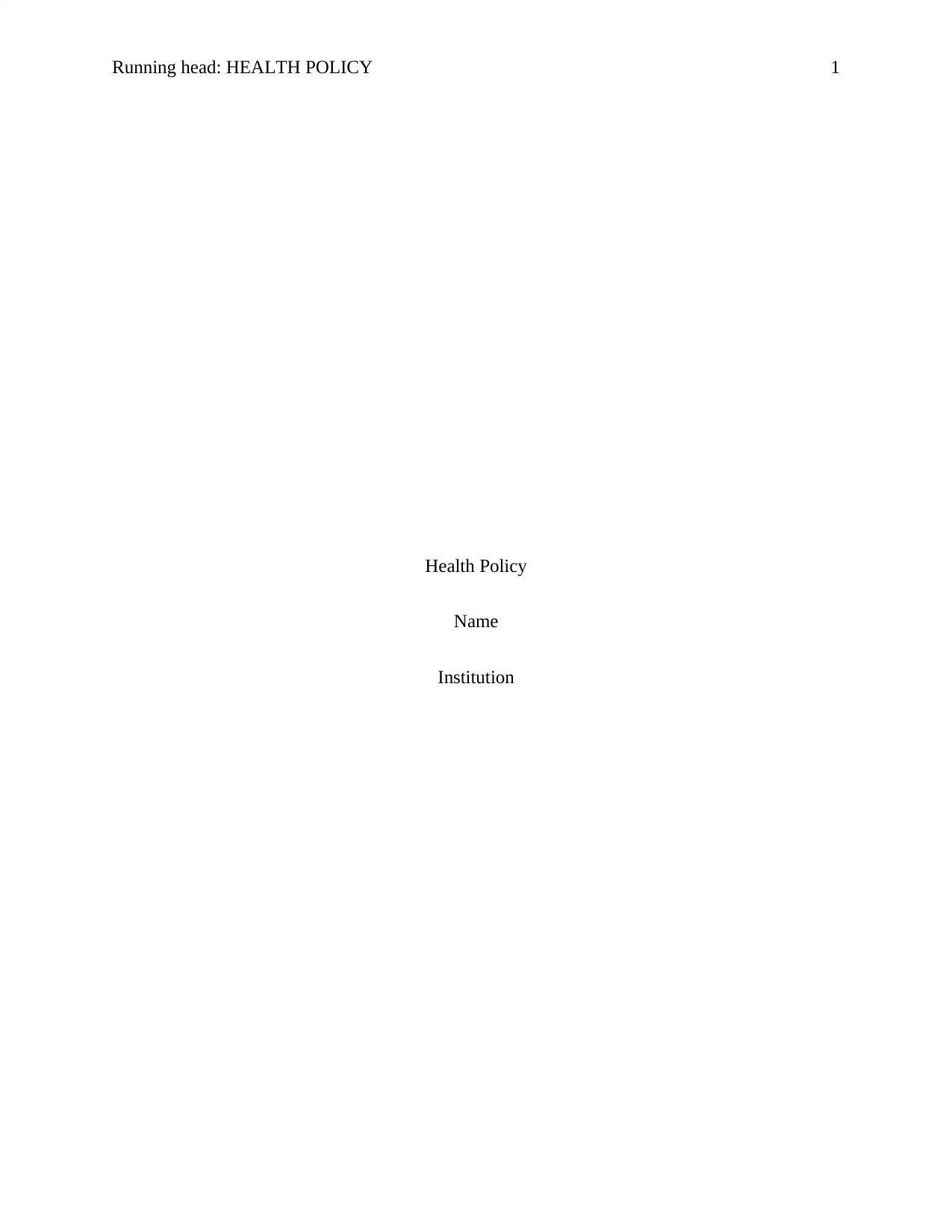
Running head: HEALTH POLICY 1
Health Policy
Name
Institution
Health Policy
Name
Institution
Paraphrase This Document
Need a fresh take? Get an instant paraphrase of this document with our AI Paraphraser
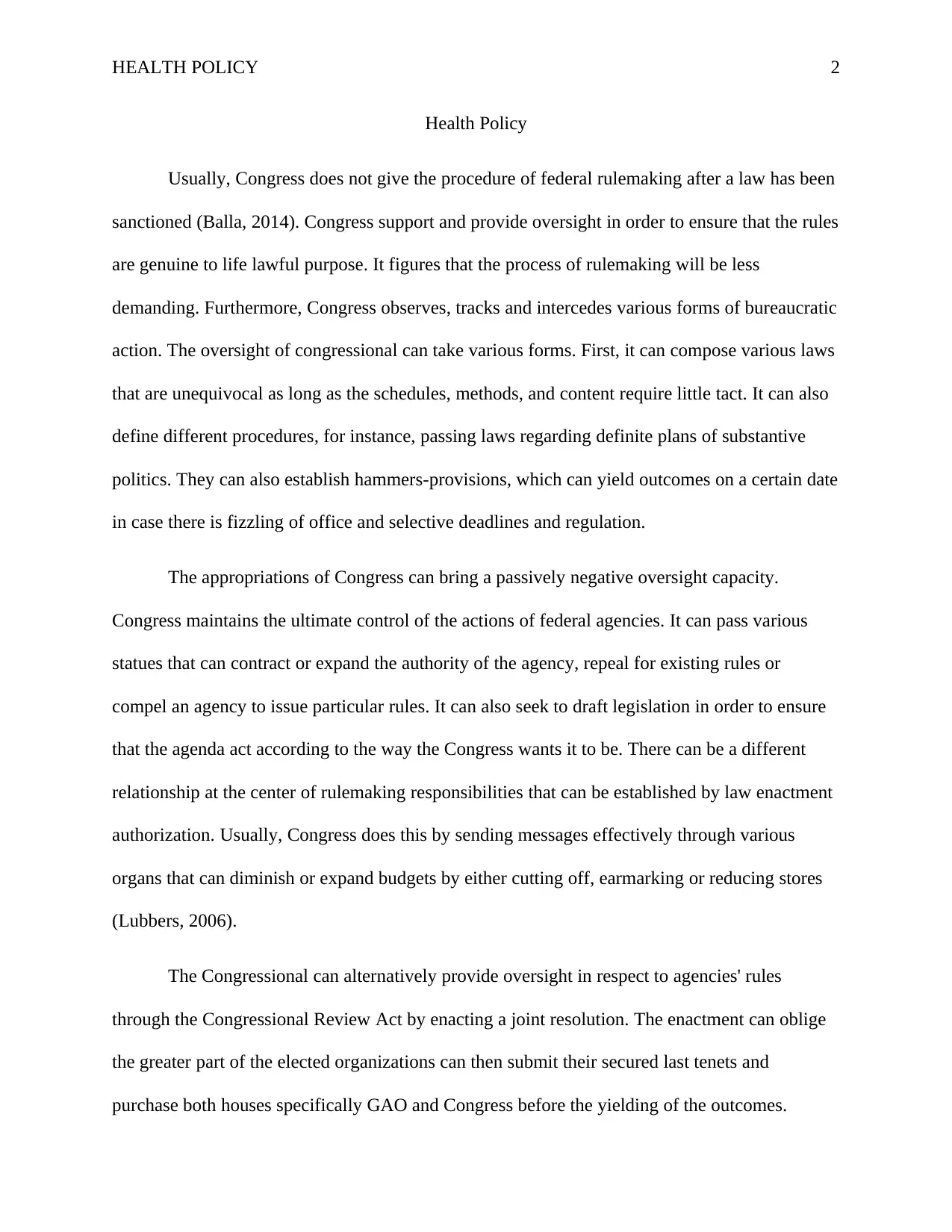
HEALTH POLICY 2
Health Policy
Usually, Congress does not give the procedure of federal rulemaking after a law has been
sanctioned (Balla, 2014). Congress support and provide oversight in order to ensure that the rules
are genuine to life lawful purpose. It figures that the process of rulemaking will be less
demanding. Furthermore, Congress observes, tracks and intercedes various forms of bureaucratic
action. The oversight of congressional can take various forms. First, it can compose various laws
that are unequivocal as long as the schedules, methods, and content require little tact. It can also
define different procedures, for instance, passing laws regarding definite plans of substantive
politics. They can also establish hammers-provisions, which can yield outcomes on a certain date
in case there is fizzling of office and selective deadlines and regulation.
The appropriations of Congress can bring a passively negative oversight capacity.
Congress maintains the ultimate control of the actions of federal agencies. It can pass various
statues that can contract or expand the authority of the agency, repeal for existing rules or
compel an agency to issue particular rules. It can also seek to draft legislation in order to ensure
that the agenda act according to the way the Congress wants it to be. There can be a different
relationship at the center of rulemaking responsibilities that can be established by law enactment
authorization. Usually, Congress does this by sending messages effectively through various
organs that can diminish or expand budgets by either cutting off, earmarking or reducing stores
(Lubbers, 2006).
The Congressional can alternatively provide oversight in respect to agencies' rules
through the Congressional Review Act by enacting a joint resolution. The enactment can oblige
the greater part of the elected organizations can then submit their secured last tenets and
purchase both houses specifically GAO and Congress before the yielding of the outcomes.
Health Policy
Usually, Congress does not give the procedure of federal rulemaking after a law has been
sanctioned (Balla, 2014). Congress support and provide oversight in order to ensure that the rules
are genuine to life lawful purpose. It figures that the process of rulemaking will be less
demanding. Furthermore, Congress observes, tracks and intercedes various forms of bureaucratic
action. The oversight of congressional can take various forms. First, it can compose various laws
that are unequivocal as long as the schedules, methods, and content require little tact. It can also
define different procedures, for instance, passing laws regarding definite plans of substantive
politics. They can also establish hammers-provisions, which can yield outcomes on a certain date
in case there is fizzling of office and selective deadlines and regulation.
The appropriations of Congress can bring a passively negative oversight capacity.
Congress maintains the ultimate control of the actions of federal agencies. It can pass various
statues that can contract or expand the authority of the agency, repeal for existing rules or
compel an agency to issue particular rules. It can also seek to draft legislation in order to ensure
that the agenda act according to the way the Congress wants it to be. There can be a different
relationship at the center of rulemaking responsibilities that can be established by law enactment
authorization. Usually, Congress does this by sending messages effectively through various
organs that can diminish or expand budgets by either cutting off, earmarking or reducing stores
(Lubbers, 2006).
The Congressional can alternatively provide oversight in respect to agencies' rules
through the Congressional Review Act by enacting a joint resolution. The enactment can oblige
the greater part of the elected organizations can then submit their secured last tenets and
purchase both houses specifically GAO and Congress before the yielding of the outcomes.
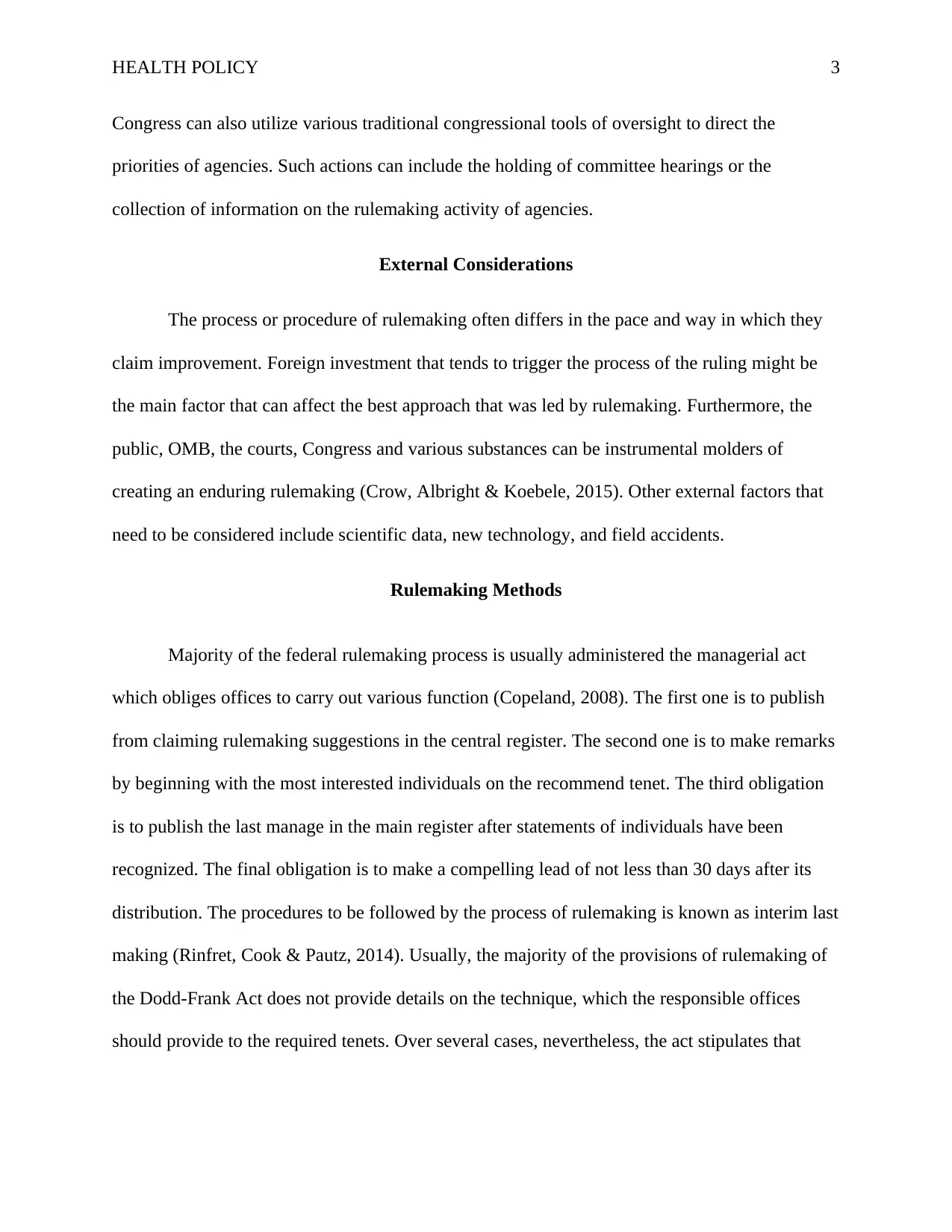
HEALTH POLICY 3
Congress can also utilize various traditional congressional tools of oversight to direct the
priorities of agencies. Such actions can include the holding of committee hearings or the
collection of information on the rulemaking activity of agencies.
External Considerations
The process or procedure of rulemaking often differs in the pace and way in which they
claim improvement. Foreign investment that tends to trigger the process of the ruling might be
the main factor that can affect the best approach that was led by rulemaking. Furthermore, the
public, OMB, the courts, Congress and various substances can be instrumental molders of
creating an enduring rulemaking (Crow, Albright & Koebele, 2015). Other external factors that
need to be considered include scientific data, new technology, and field accidents.
Rulemaking Methods
Majority of the federal rulemaking process is usually administered the managerial act
which obliges offices to carry out various function (Copeland, 2008). The first one is to publish
from claiming rulemaking suggestions in the central register. The second one is to make remarks
by beginning with the most interested individuals on the recommend tenet. The third obligation
is to publish the last manage in the main register after statements of individuals have been
recognized. The final obligation is to make a compelling lead of not less than 30 days after its
distribution. The procedures to be followed by the process of rulemaking is known as interim last
making (Rinfret, Cook & Pautz, 2014). Usually, the majority of the provisions of rulemaking of
the Dodd-Frank Act does not provide details on the technique, which the responsible offices
should provide to the required tenets. Over several cases, nevertheless, the act stipulates that
Congress can also utilize various traditional congressional tools of oversight to direct the
priorities of agencies. Such actions can include the holding of committee hearings or the
collection of information on the rulemaking activity of agencies.
External Considerations
The process or procedure of rulemaking often differs in the pace and way in which they
claim improvement. Foreign investment that tends to trigger the process of the ruling might be
the main factor that can affect the best approach that was led by rulemaking. Furthermore, the
public, OMB, the courts, Congress and various substances can be instrumental molders of
creating an enduring rulemaking (Crow, Albright & Koebele, 2015). Other external factors that
need to be considered include scientific data, new technology, and field accidents.
Rulemaking Methods
Majority of the federal rulemaking process is usually administered the managerial act
which obliges offices to carry out various function (Copeland, 2008). The first one is to publish
from claiming rulemaking suggestions in the central register. The second one is to make remarks
by beginning with the most interested individuals on the recommend tenet. The third obligation
is to publish the last manage in the main register after statements of individuals have been
recognized. The final obligation is to make a compelling lead of not less than 30 days after its
distribution. The procedures to be followed by the process of rulemaking is known as interim last
making (Rinfret, Cook & Pautz, 2014). Usually, the majority of the provisions of rulemaking of
the Dodd-Frank Act does not provide details on the technique, which the responsible offices
should provide to the required tenets. Over several cases, nevertheless, the act stipulates that
⊘ This is a preview!⊘
Do you want full access?
Subscribe today to unlock all pages.

Trusted by 1+ million students worldwide
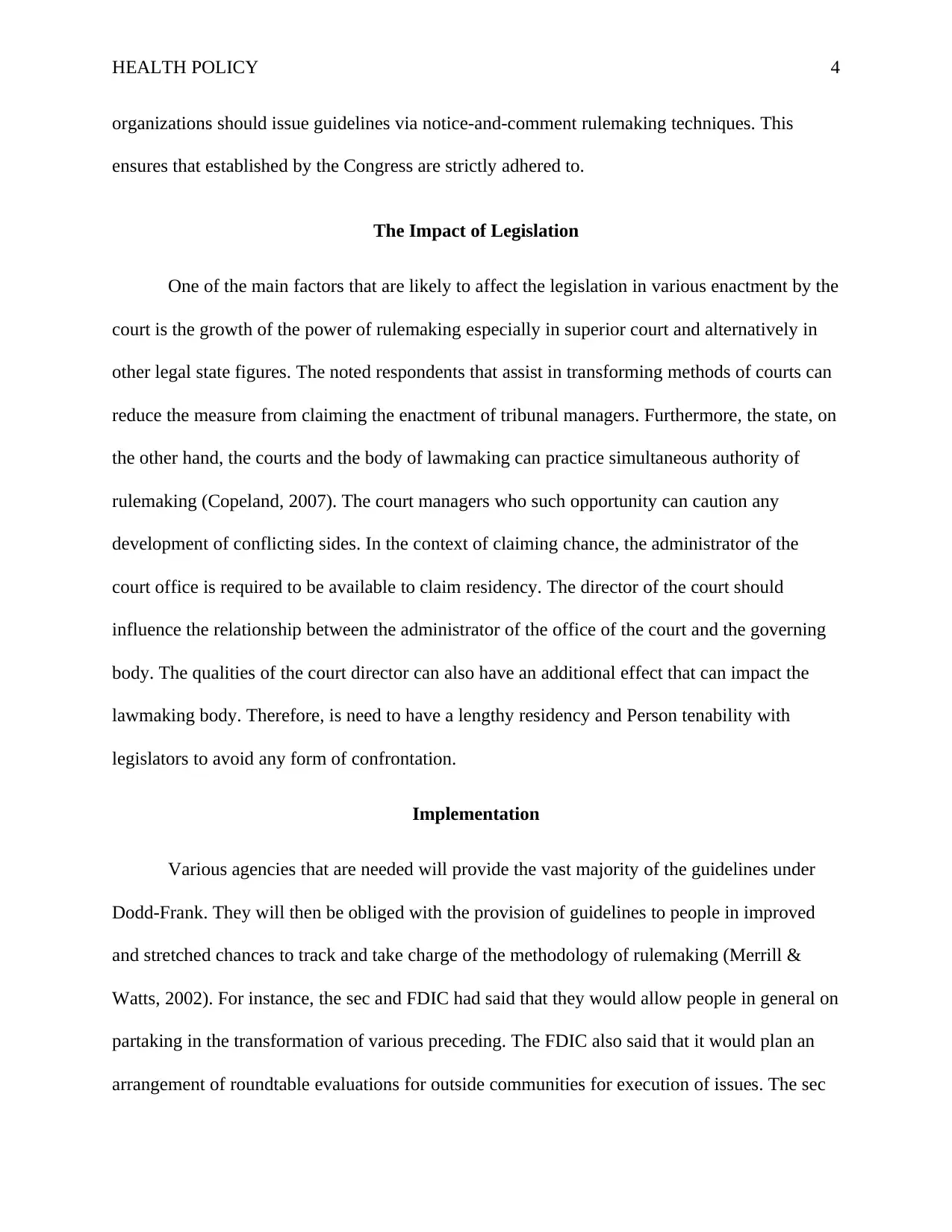
HEALTH POLICY 4
organizations should issue guidelines via notice-and-comment rulemaking techniques. This
ensures that established by the Congress are strictly adhered to.
The Impact of Legislation
One of the main factors that are likely to affect the legislation in various enactment by the
court is the growth of the power of rulemaking especially in superior court and alternatively in
other legal state figures. The noted respondents that assist in transforming methods of courts can
reduce the measure from claiming the enactment of tribunal managers. Furthermore, the state, on
the other hand, the courts and the body of lawmaking can practice simultaneous authority of
rulemaking (Copeland, 2007). The court managers who such opportunity can caution any
development of conflicting sides. In the context of claiming chance, the administrator of the
court office is required to be available to claim residency. The director of the court should
influence the relationship between the administrator of the office of the court and the governing
body. The qualities of the court director can also have an additional effect that can impact the
lawmaking body. Therefore, is need to have a lengthy residency and Person tenability with
legislators to avoid any form of confrontation.
Implementation
Various agencies that are needed will provide the vast majority of the guidelines under
Dodd-Frank. They will then be obliged with the provision of guidelines to people in improved
and stretched chances to track and take charge of the methodology of rulemaking (Merrill &
Watts, 2002). For instance, the sec and FDIC had said that they would allow people in general on
partaking in the transformation of various preceding. The FDIC also said that it would plan an
arrangement of roundtable evaluations for outside communities for execution of issues. The sec
organizations should issue guidelines via notice-and-comment rulemaking techniques. This
ensures that established by the Congress are strictly adhered to.
The Impact of Legislation
One of the main factors that are likely to affect the legislation in various enactment by the
court is the growth of the power of rulemaking especially in superior court and alternatively in
other legal state figures. The noted respondents that assist in transforming methods of courts can
reduce the measure from claiming the enactment of tribunal managers. Furthermore, the state, on
the other hand, the courts and the body of lawmaking can practice simultaneous authority of
rulemaking (Copeland, 2007). The court managers who such opportunity can caution any
development of conflicting sides. In the context of claiming chance, the administrator of the
court office is required to be available to claim residency. The director of the court should
influence the relationship between the administrator of the office of the court and the governing
body. The qualities of the court director can also have an additional effect that can impact the
lawmaking body. Therefore, is need to have a lengthy residency and Person tenability with
legislators to avoid any form of confrontation.
Implementation
Various agencies that are needed will provide the vast majority of the guidelines under
Dodd-Frank. They will then be obliged with the provision of guidelines to people in improved
and stretched chances to track and take charge of the methodology of rulemaking (Merrill &
Watts, 2002). For instance, the sec and FDIC had said that they would allow people in general on
partaking in the transformation of various preceding. The FDIC also said that it would plan an
arrangement of roundtable evaluations for outside communities for execution of issues. The sec
Paraphrase This Document
Need a fresh take? Get an instant paraphrase of this document with our AI Paraphraser
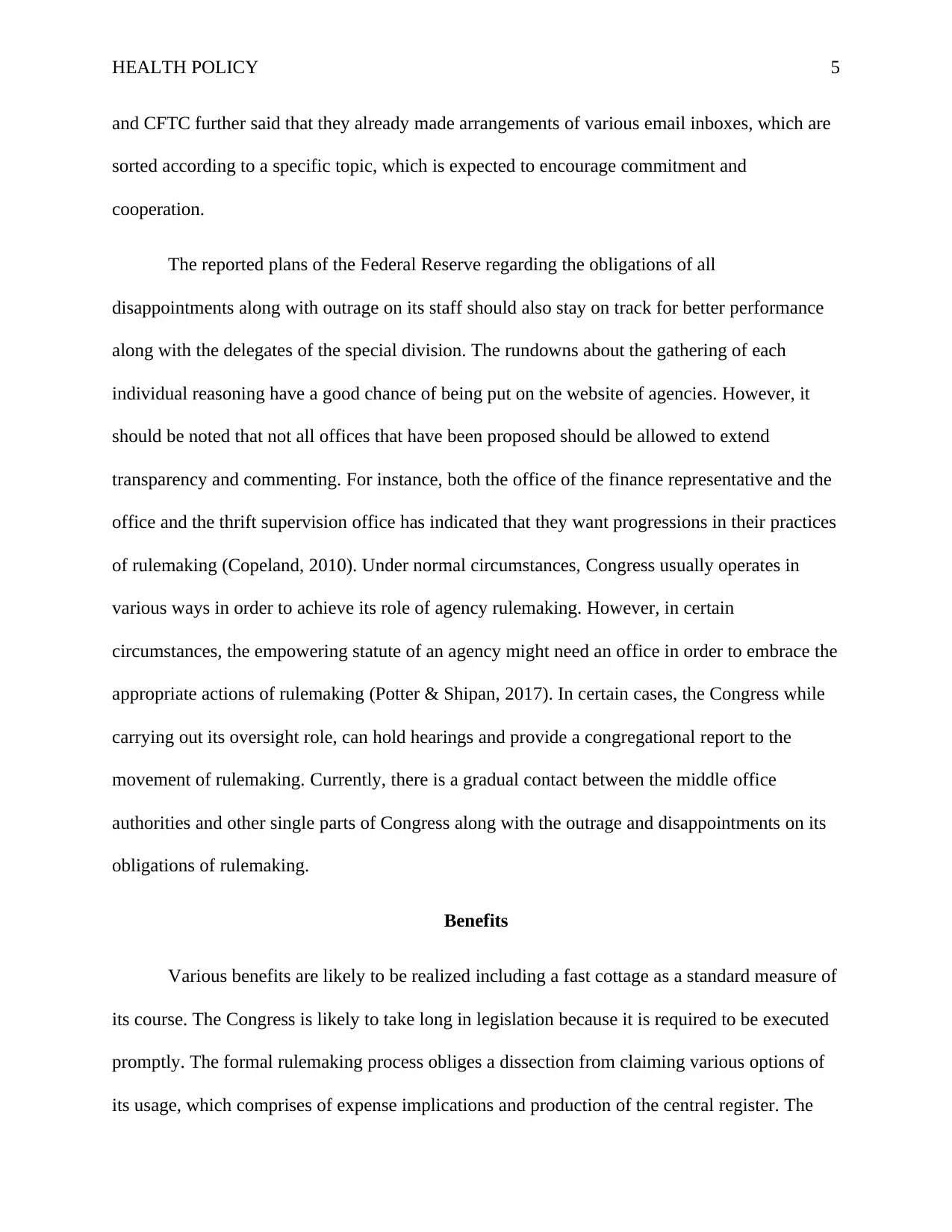
HEALTH POLICY 5
and CFTC further said that they already made arrangements of various email inboxes, which are
sorted according to a specific topic, which is expected to encourage commitment and
cooperation.
The reported plans of the Federal Reserve regarding the obligations of all
disappointments along with outrage on its staff should also stay on track for better performance
along with the delegates of the special division. The rundowns about the gathering of each
individual reasoning have a good chance of being put on the website of agencies. However, it
should be noted that not all offices that have been proposed should be allowed to extend
transparency and commenting. For instance, both the office of the finance representative and the
office and the thrift supervision office has indicated that they want progressions in their practices
of rulemaking (Copeland, 2010). Under normal circumstances, Congress usually operates in
various ways in order to achieve its role of agency rulemaking. However, in certain
circumstances, the empowering statute of an agency might need an office in order to embrace the
appropriate actions of rulemaking (Potter & Shipan, 2017). In certain cases, the Congress while
carrying out its oversight role, can hold hearings and provide a congregational report to the
movement of rulemaking. Currently, there is a gradual contact between the middle office
authorities and other single parts of Congress along with the outrage and disappointments on its
obligations of rulemaking.
Benefits
Various benefits are likely to be realized including a fast cottage as a standard measure of
its course. The Congress is likely to take long in legislation because it is required to be executed
promptly. The formal rulemaking process obliges a dissection from claiming various options of
its usage, which comprises of expense implications and production of the central register. The
and CFTC further said that they already made arrangements of various email inboxes, which are
sorted according to a specific topic, which is expected to encourage commitment and
cooperation.
The reported plans of the Federal Reserve regarding the obligations of all
disappointments along with outrage on its staff should also stay on track for better performance
along with the delegates of the special division. The rundowns about the gathering of each
individual reasoning have a good chance of being put on the website of agencies. However, it
should be noted that not all offices that have been proposed should be allowed to extend
transparency and commenting. For instance, both the office of the finance representative and the
office and the thrift supervision office has indicated that they want progressions in their practices
of rulemaking (Copeland, 2010). Under normal circumstances, Congress usually operates in
various ways in order to achieve its role of agency rulemaking. However, in certain
circumstances, the empowering statute of an agency might need an office in order to embrace the
appropriate actions of rulemaking (Potter & Shipan, 2017). In certain cases, the Congress while
carrying out its oversight role, can hold hearings and provide a congregational report to the
movement of rulemaking. Currently, there is a gradual contact between the middle office
authorities and other single parts of Congress along with the outrage and disappointments on its
obligations of rulemaking.
Benefits
Various benefits are likely to be realized including a fast cottage as a standard measure of
its course. The Congress is likely to take long in legislation because it is required to be executed
promptly. The formal rulemaking process obliges a dissection from claiming various options of
its usage, which comprises of expense implications and production of the central register. The
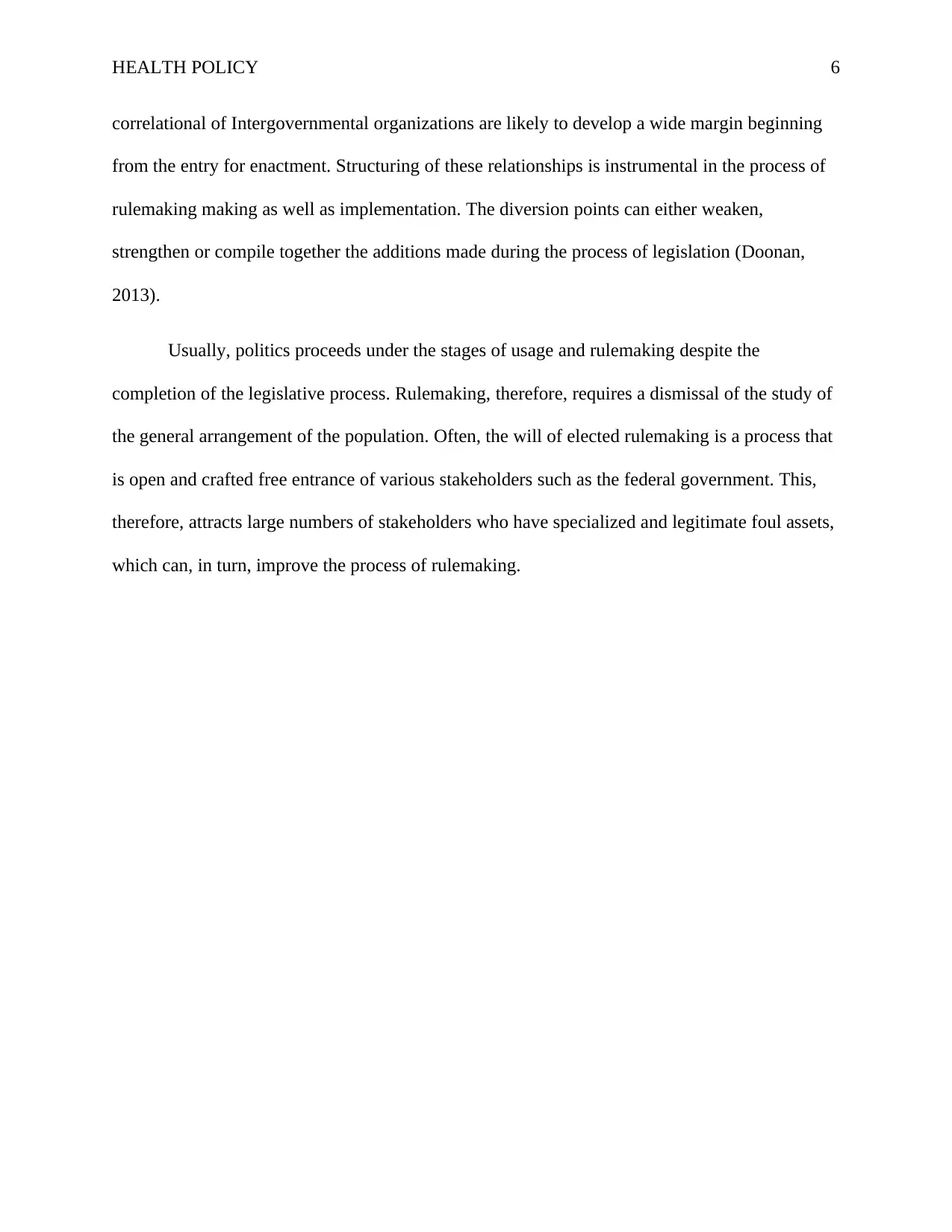
HEALTH POLICY 6
correlational of Intergovernmental organizations are likely to develop a wide margin beginning
from the entry for enactment. Structuring of these relationships is instrumental in the process of
rulemaking making as well as implementation. The diversion points can either weaken,
strengthen or compile together the additions made during the process of legislation (Doonan,
2013).
Usually, politics proceeds under the stages of usage and rulemaking despite the
completion of the legislative process. Rulemaking, therefore, requires a dismissal of the study of
the general arrangement of the population. Often, the will of elected rulemaking is a process that
is open and crafted free entrance of various stakeholders such as the federal government. This,
therefore, attracts large numbers of stakeholders who have specialized and legitimate foul assets,
which can, in turn, improve the process of rulemaking.
correlational of Intergovernmental organizations are likely to develop a wide margin beginning
from the entry for enactment. Structuring of these relationships is instrumental in the process of
rulemaking making as well as implementation. The diversion points can either weaken,
strengthen or compile together the additions made during the process of legislation (Doonan,
2013).
Usually, politics proceeds under the stages of usage and rulemaking despite the
completion of the legislative process. Rulemaking, therefore, requires a dismissal of the study of
the general arrangement of the population. Often, the will of elected rulemaking is a process that
is open and crafted free entrance of various stakeholders such as the federal government. This,
therefore, attracts large numbers of stakeholders who have specialized and legitimate foul assets,
which can, in turn, improve the process of rulemaking.
⊘ This is a preview!⊘
Do you want full access?
Subscribe today to unlock all pages.

Trusted by 1+ million students worldwide
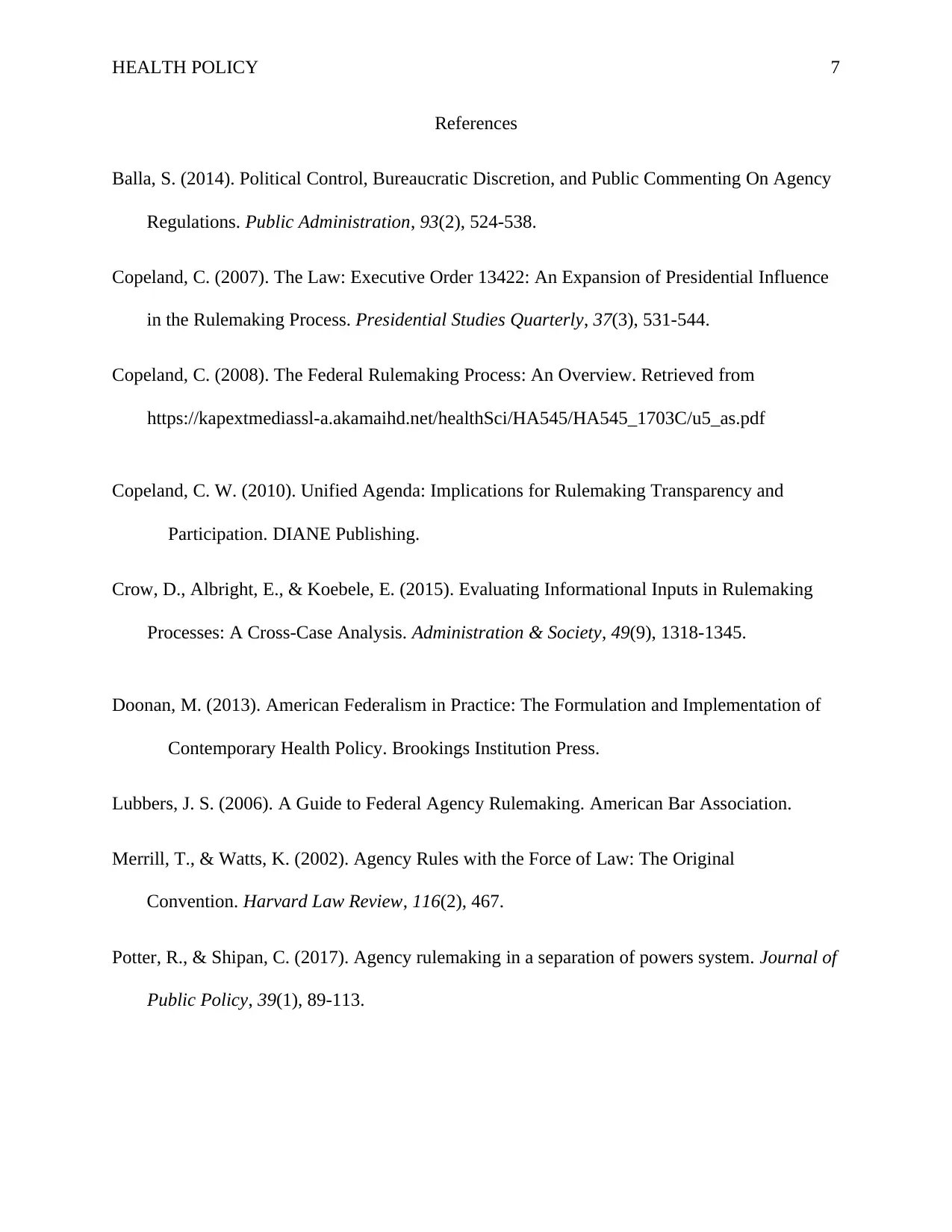
HEALTH POLICY 7
References
Balla, S. (2014). Political Control, Bureaucratic Discretion, and Public Commenting On Agency
Regulations. Public Administration, 93(2), 524-538.
Copeland, C. (2007). The Law: Executive Order 13422: An Expansion of Presidential Influence
in the Rulemaking Process. Presidential Studies Quarterly, 37(3), 531-544.
Copeland, C. (2008). The Federal Rulemaking Process: An Overview. Retrieved from
https://kapextmediassl-a.akamaihd.net/healthSci/HA545/HA545_1703C/u5_as.pdf
Copeland, C. W. (2010). Unified Agenda: Implications for Rulemaking Transparency and
Participation. DIANE Publishing.
Crow, D., Albright, E., & Koebele, E. (2015). Evaluating Informational Inputs in Rulemaking
Processes: A Cross-Case Analysis. Administration & Society, 49(9), 1318-1345.
Doonan, M. (2013). American Federalism in Practice: The Formulation and Implementation of
Contemporary Health Policy. Brookings Institution Press.
Lubbers, J. S. (2006). A Guide to Federal Agency Rulemaking. American Bar Association.
Merrill, T., & Watts, K. (2002). Agency Rules with the Force of Law: The Original
Convention. Harvard Law Review, 116(2), 467.
Potter, R., & Shipan, C. (2017). Agency rulemaking in a separation of powers system. Journal of
Public Policy, 39(1), 89-113.
References
Balla, S. (2014). Political Control, Bureaucratic Discretion, and Public Commenting On Agency
Regulations. Public Administration, 93(2), 524-538.
Copeland, C. (2007). The Law: Executive Order 13422: An Expansion of Presidential Influence
in the Rulemaking Process. Presidential Studies Quarterly, 37(3), 531-544.
Copeland, C. (2008). The Federal Rulemaking Process: An Overview. Retrieved from
https://kapextmediassl-a.akamaihd.net/healthSci/HA545/HA545_1703C/u5_as.pdf
Copeland, C. W. (2010). Unified Agenda: Implications for Rulemaking Transparency and
Participation. DIANE Publishing.
Crow, D., Albright, E., & Koebele, E. (2015). Evaluating Informational Inputs in Rulemaking
Processes: A Cross-Case Analysis. Administration & Society, 49(9), 1318-1345.
Doonan, M. (2013). American Federalism in Practice: The Formulation and Implementation of
Contemporary Health Policy. Brookings Institution Press.
Lubbers, J. S. (2006). A Guide to Federal Agency Rulemaking. American Bar Association.
Merrill, T., & Watts, K. (2002). Agency Rules with the Force of Law: The Original
Convention. Harvard Law Review, 116(2), 467.
Potter, R., & Shipan, C. (2017). Agency rulemaking in a separation of powers system. Journal of
Public Policy, 39(1), 89-113.
Paraphrase This Document
Need a fresh take? Get an instant paraphrase of this document with our AI Paraphraser
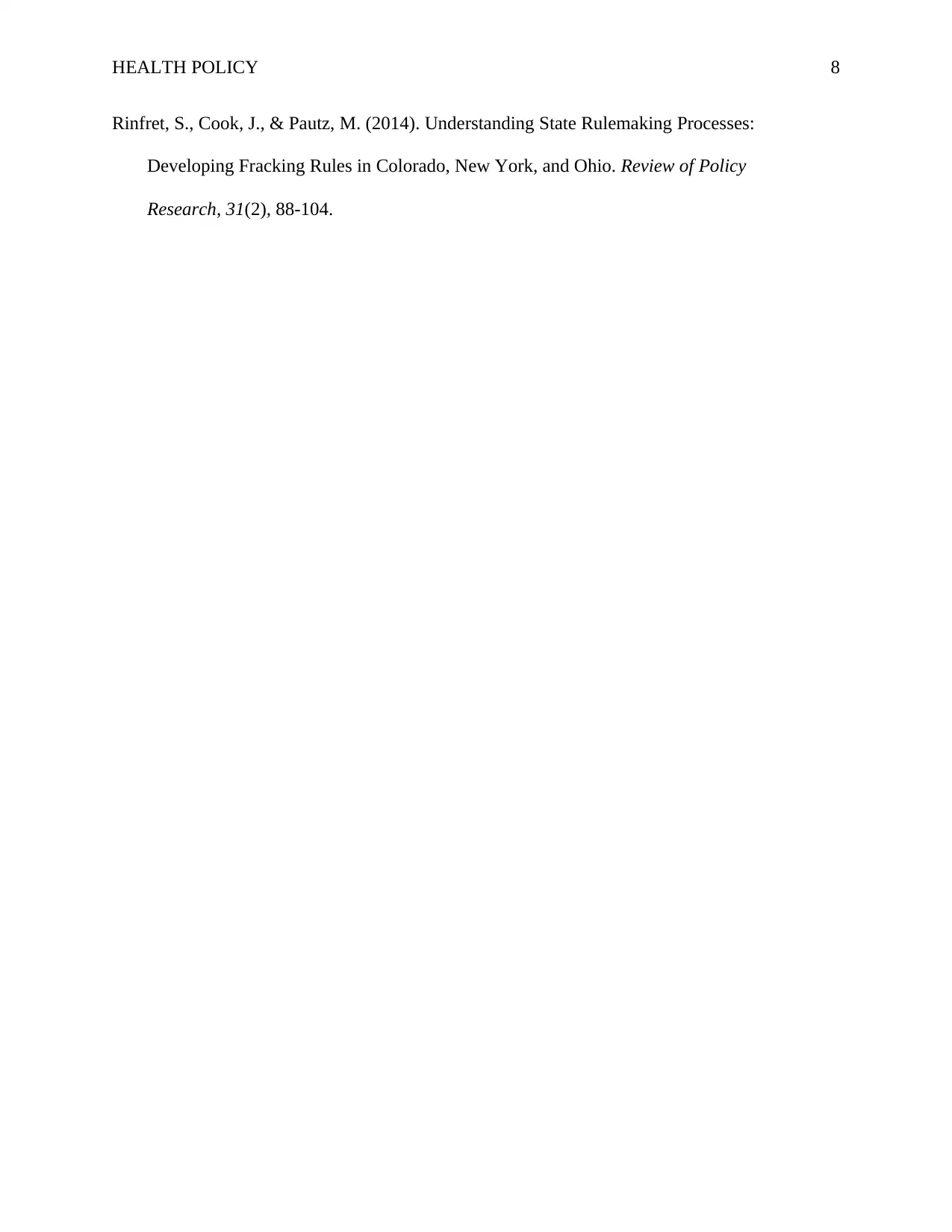
HEALTH POLICY 8
Rinfret, S., Cook, J., & Pautz, M. (2014). Understanding State Rulemaking Processes:
Developing Fracking Rules in Colorado, New York, and Ohio. Review of Policy
Research, 31(2), 88-104.
Rinfret, S., Cook, J., & Pautz, M. (2014). Understanding State Rulemaking Processes:
Developing Fracking Rules in Colorado, New York, and Ohio. Review of Policy
Research, 31(2), 88-104.
1 out of 8
Related Documents
Your All-in-One AI-Powered Toolkit for Academic Success.
+13062052269
info@desklib.com
Available 24*7 on WhatsApp / Email
![[object Object]](/_next/static/media/star-bottom.7253800d.svg)
Unlock your academic potential
Copyright © 2020–2026 A2Z Services. All Rights Reserved. Developed and managed by ZUCOL.





